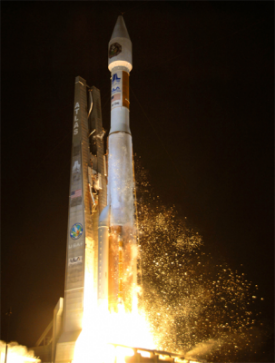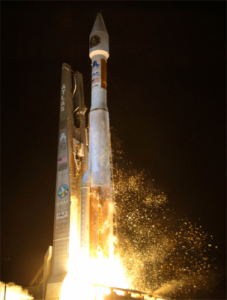
Senators Call on DOD for Competition in Air Force Space Launch Program
 Yesterday, Senator Dianne Feinstein, Chairman of the Senate Select Committee on Intelligence, and six other Senators called on the Department of Defense to allow more competition within the U.S. Air Force’s Evolved Expendable Launch Vehicle (EELV) program.
Yesterday, Senator Dianne Feinstein, Chairman of the Senate Select Committee on Intelligence, and six other Senators called on the Department of Defense to allow more competition within the U.S. Air Force’s Evolved Expendable Launch Vehicle (EELV) program.
“We write to express our concern regarding the Air Force’s proposed reduction in competition opportunities for new entrants in the Evolved Expendable Launch Vehicle (EELV) program,” the senators wrote. “We strongly believe this proposal undermines the Air Force’s previous plan to begin to compete launches in 2015 and urge you to take all necessary steps to ensure the Air Force fulfills its commitment to provide meaningful competition opportunities this year for award in fiscal year 2015 and beyond.”
This comes at a time when there is much concern over the reliance on Russian technology and engines, such as the RD-180, which serves as the backbone of one of the Pentagon’s premier space launch vehicles used for military-space operations, the Atlas V (pictured left). Not to mention the deteriorating U.S./Russian relations over the ongoing crisis in the Crimean Peninsula.
“While Vladimir Putin basks in the glory of his remarkable land grab in Crimea, he laughs all the way to the bank, hand in hand with his GRU. America – and our allies – need to rethink our security strategy.
Can you believe that we continue to subsidize the Russian rocket industry (and economy) with the continued purchase of the RD 180 rocket engines – which is our primary source for launching our own reconnaissance satellites? Not only that, our taxpayer dollars go to invest in Russian missile technology – that they sell around the world.
We now have significant reasons to sever this umbilical cord. First, our national security is in jeopardy when we are dependent on Russia for satellite launches. Second, we need to stop paying for the Russian defense industry that has just annexed a part of a sovereign nation. And third, it is time we return to invest here in the United States – to secure our own economy and industrial base.” – BrigGen. Steve Cheney, CEO of ASP
Furthermore, according to Reuters, Air Force Secretary Deborah James told the committee that she also found the reliance on Russian engines “worrisome”. However, she expects that Air Force officials will complete a study of the issue by late May that will look at alternatives, such as possible U.S. production of the motors and the likely cost.
The American Security Project is examining these key issues, educating the public and policy makers of the implications of our present approach, as well as suggesting ways to further enhance our national security.
Check out our new report: National Security and America’s Space Challenges by ASP Adjunct Fellow August Cole, as well as the recap of an event we hosted earlier this week: The Battle on the Final Frontier – A Discussion of National Security and Space.
Keep up with all of ASP’s work on this issue, along with what’s happing in the news at www.nationalsecurityandspace.org
Check out the full letter from the Senators below:
April 1, 2014
The Honorable Chuck Hagel
Secretary
Department of Defense
1000 Defense Pentagon
Washington, DC 20301-1000
Dear Secretary Hagel:
We write to express our concern regarding the Air Force’s proposed reduction in competition opportunities for new entrants in the Evolved Expendable Launch Vehicle (EELV) program. We strongly believe this proposal undermines the Air Force’s previous plan to begin to compete launches in 2015 and urge you to take all necessary steps to ensure the Air Force fulfills its commitment to provide meaningful competition opportunities this year for award in fiscal year 2015 and beyond.
As you know, Under Secretary of Defense for Acquisition, Technology and Logistics Frank Kendall issued an Acquisition Decision Memorandum on November 27, 2012, directing the Air Force to “aggressively introduce a competitive procurement environment” for the EELV program, and identify “up to 14 missions that should be competed as early as 2015.”
However, the Air Force’s recent budget proposal includes plans to compete zero Air Force missions in 2015 and to reduce the total number of missions to be competed from 14 to 7 during fiscal years 2015 – 2017. We believe this action does not comply with the 2012 Acquisition Decision Memorandum and should be immediately reviewed.
The lack of competition in the EELV program comes at a time when the cost of national security space launches has greatly increased. The EELV program has incurred massive cost overruns since the United Launch Alliance was formed in 2006. Since 2011 alone, the amounts budgeted by the Air Force for an average of six satellite launches per year has grown by 60 percent. The President’s fiscal year 2015 budget request revealed that the unit price to the Air Force had risen nearly $200 million since fiscal year 2014 at a time when the previous plan promised serious savings to the Air Force. These increased costs in a difficult budget environment are a clear indication as to why these launches should be competed.
We understand from recent public statements from the Air Force that new entrants to the EELV program may be certified this year. If there is more than one certified provider capable of executing any Air Force launch, we believe that those missions should be competed.
Thank you for your consideration. We look forward to your prompt response.
Sincerely,
Dianne Feinstein, United States Senator
Barbara Boxer, United States Senator
Tom Udall, United States Senator
Martin Heinrich, United States Senator
Mark Warner, United States Senator
Roger Wicker, United States Senator
Claire McCaskill, United States Senator
Nathan Daniels is a Research Assistant & Intern at the American Security Project. He is a senior at the University of Tennessee at Martin pursuing a B.A. in Political Science with a concentration in International Security Studies. Follow him on Twitter: @nathanldaniels
Photo Credit: A United Launch Alliance Atlas V rocket carrying the Air Force’s second Wideband Global Satellite Communications system lifts off from Space Launch Complex-41 April 3 at Cape Canaveral Air Force Station, Fla. After a 31-minute flight, WGS-2 was placed successfully in orbit where it will provide enhanced communication abilities to troops in the field. (Department of Defense, Air Force)






[…] Senators Call on DOD for Competition in Air Force Space Launch Program Nathan Daniels […]